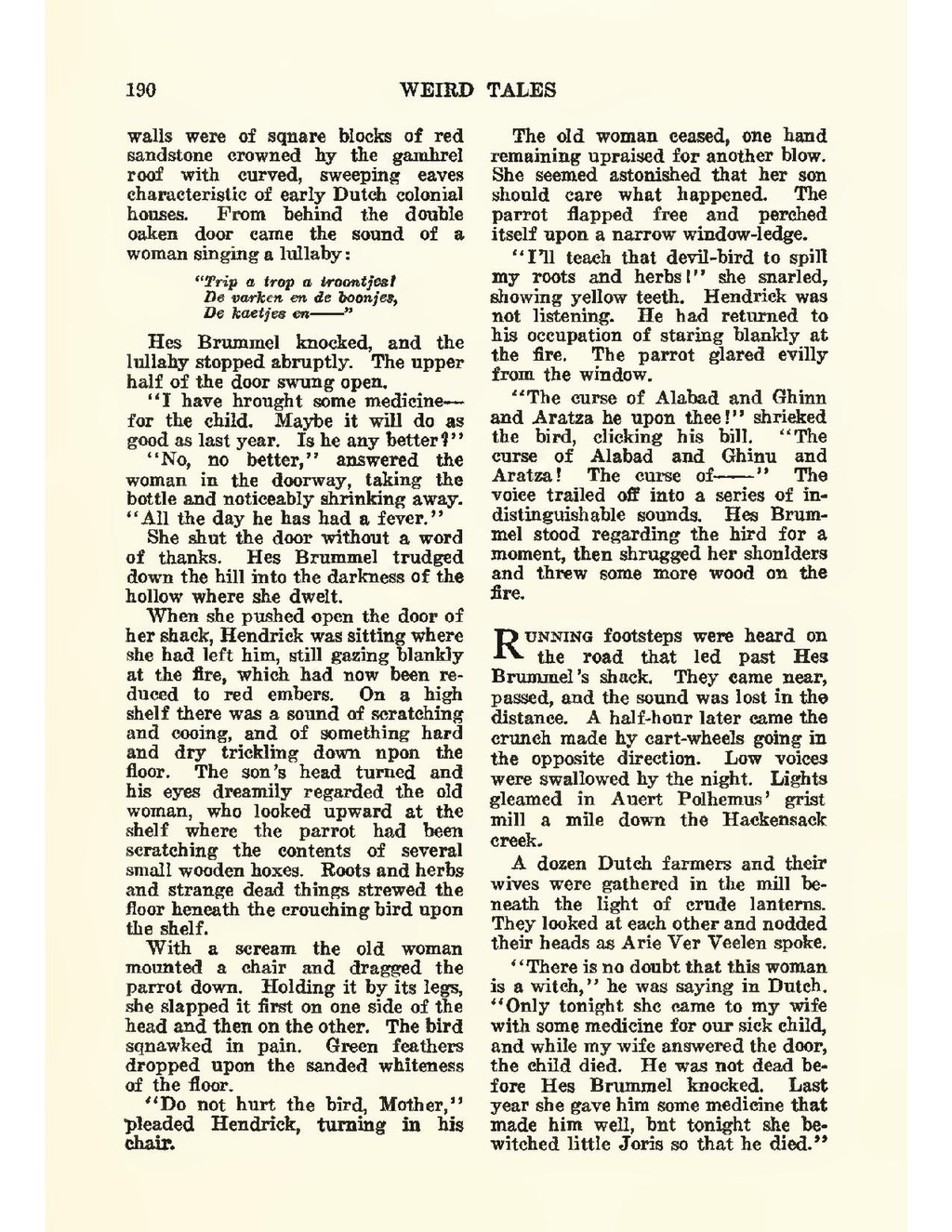walls were of square blocks of red
sandstone crowned by the gambrel
roof with curved, sweeping eaves
characteristic of early Dutch colonial
houses. From behind the double
oaken door came the sound of a
woman singing a lullaby:
De varken en de boonjes,
De kaetjes en-------"
Hes Brummel knocked, and the lullaby stopped abruptly. The upper half of the door swung open. “I have brought some medicine— for the child. Maybe it will do as good as last year. Is he any better? ’’ “No, no better,” answered the woman in the doorway, taking the bottle and noticeably shrinking away. “All the day he has had a fever.” She shut the door without a word of thanks. Hes Brummel trudged down the hill into the darkness of the hollow where she dwelt. When she pushed open the door of her shack, Hendrick was sitting where she had left him, still gazing blankly at the fire, which had now been reduced to red embers. On a high shelf there was a sound of scratching and cooing, and of something hard and dry trickling down upon the floor. The son’s head turned and his eyes dreamily regarded the old woman, who looked upward at the shelf where the parrot had been scratching the contents of several small wooden boxes. Roots and herbs and strange dead things strewed the floor beneath the crouching bird upon the shelf. With a scream the old woman mounted a chair and dragged the parrot down. Holding it by its legs, she slapped it first on one side of the head and then on the other. The bird squawked in pain. Green feathers dropped upon the sanded whiteness of the floor. “Do not hurt the bird, Mother,” pleaded Hendrick, turning in his chair. The old woman ceased, one hand remaining upraised for another blow. She seemed astonished that her son should care what happened. The parrot flapped free and perched itself upon a narrow window-ledge. “I’ll teach that devil-bird to spill my roots and herbs!’’ she snarled, showing yellow teeth. Hendrick was not listening. He had returned to his occupation of staring blankly at the fire. The parrot glared evilly from the window. “The curse of Alabad and Ghinu and Aratza be upon thee!” shrieked the bird, clicking his bill. “The curse of Alabad and Ghinu and Aratza! The curse of-” The voice trailed off into a series of indistinguishable sounds. Hes Brummel stood regarding the bird for a moment, then shrugged her shoulders and threw some more wood on the fire.
Running footsteps were heard on the road that led past Hes Brummel’s shack. They came near, passed, and the sound was lost in the distance. A half-hour later came the crunch made by cart-wheels going in the opposite direction. Low voices were swallowed by the night. Lights gleamed in Auert Polhemus’ grist mill a mile down the Hackensack creek. A dozen Dutch farmers and their wives were gathered in the mill beneath the light of crude lanterns. They looked at each other and nodded their heads as Arie Ver Veelen spoke. ‘‘There is no doubt that this woman is a witch,” he was saying in Dutch. “Only tonight she came to my wife with some medicine for our sick child, and while my wife answered the door, the child died. He was not dead before Hes Brummel knocked. Last year she gave him some medicine that made him well, but tonight she bewitched little Joris so that he died.”
